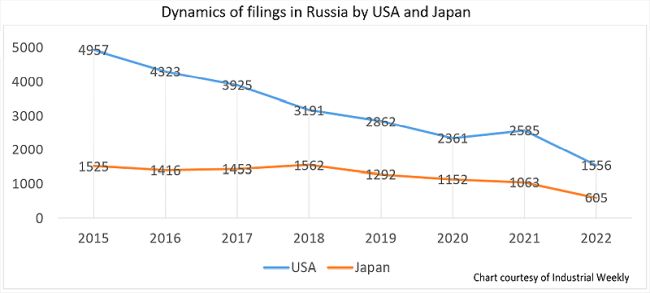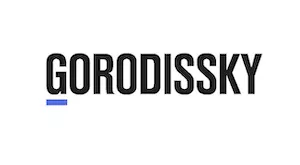Sanctions imposed on Russia because of the military conflict with the Ukraine are designed to stifle Russian economy. They do that to an extent. In some cases however they have undesirable and unexpected repercussions opposite to what was expected.
Industrial Weekly ?24 (promweekly.ru), a Russian magazine of the Ministry of Industry and Trade ran an article describing the new openings for the Russian companies who use sanctions to their advantage.
From February 2022 there were several waves of sanctions and this process is being continued. The sanctions entailed refusal of western and asian companies to work in Russia, even to the detriment of their business. Some of the companies curtailed their business of their own accord, others found themselves under pressure of their governments and unwillingly wound down their business in Russia.
The political events affected intellectual property too. For many years the immense Russian market was attractive for foreign companies. For the most part this could be explained by the fact that the Russian economy was based on sales of its natural resources. Foreign companies directly exported their products to Russia, set up joint ventures and their subsidiaries. The market was replete with industrial and consumer goods produced by foreign companies. The business of foreign companies was protected by their patents and trademarks registered in Russia.
After the avalanche of sanctions the inflow of goods stopped to a large extent which squeezed the market. It is not without reason that the Russian government allowed parallel import of certain goods. Though the local law provides for national (regional) exhaustion of rights the Ministry of Industry and Trade issued a temporary list of goods allowed for parallel import. The list includes only the goods which are in short supply on the market. The list is often reviewed depending on the situation on the domestic market. Some goods are added, other goods are excluded from the list restoring national exhaustion of rights for them. The goods, regardless of whether they are parallel or not are often protected by patents and/or trademarks.
Registrations of patents and trademarks seriously restricts the use of patented and branded goods. Regardless of the sanctions and countersanctions applied by Russia intellectual property laws are there as well as enforcement thereof. Foreign companies readily enforce their rights in case of infringement. Suffice it to say that the notorious case of Peppa Pig where the British owner lost the case at first but appealed the judgment and won it; the infringement was stopped and the infringer paid compensation to the trademark owner. The same may be said about patents. Thus, Harman International Industries, a US company, has patent No 113661 in Russia. It dealt with an attempted infringement, initiated a court case and received compensation despite the appeals by the infringer.
Such cases are many. Reference to the unfriendly status of a country does not help the infringers.
Now, the number of applications filed by companies from foreign countries fell to a minimum and this creates a new situation. Below is given a chart of two selected countries.

The magazine noted that while the number of new patent applications fell in Russia the companies continue to file in their respective countries. Their applications are published in the open sources and become available to the public either in their own countries or as a result of publications by WIPO in case of PCT applications. A patent application discloses the invention fully enough to be understood by a person skilled in the art. Since there is no patent application in Russia but information on the invention is widely available, any interested person may avail himself of the unexpected gift and reproduce a product or a device described in a patent application without infringing IP rights.
This unique situation allows the Russian companies to access extensive array of information on new technologies in their specialty and choose what may be used by them.
Thus, for instance ROCKWELL COLLINS (US) filed a patent application No US2023066768A. It did not file it in Russia. In the meantime, a St.Petersburg Institute of Aviation Instrumentation "developed" an analogue of the US TCAS and even published a relevant piece of news.
SIEMENS: filed a patent application: in USA (but not in Russia) US2020363777A, WO23061633. Schneider Electric did the same WO23275294. In the meantime, INSYTE, a Russian company in the city of Perm presumably mirrored their automation system.
Korean company S.T. CORP CO LTD (KR) did not patent a metal body smartphone. Yadro, a Russian company, is poised to manufacture a smartphone Kvadra presumably using the Korean patent.
In the absence of the detailed analysis one cannot assert that the Russians products are accurately copied from the patents or applications however the sequence of events leads to such conclusion.
It is certain that Russian companies closely follow what is being developed by their counterparts in other countries and use information of inventions not patented in Russia.
This seems to become a Klondike gold rush in Russia. This situation was foreseen by the US Office of Foreign Assets Control. In their General License No 31 of May 5, 2022 OFAC authorized any transactions in connection with intellectual property in Russia to avoid unauthorized use of IP in Russia. Further, on May 25, 2022 it allowed payment of taxes and fees in connection with IP in Russia. It understood that as long as the Russian law and courts continue to enforce foreign IP rights new technologies will stay out of reach of the Russian companies.
At the same time, the government drafted an order dated July 13, 2023 aimed at stimulating investments by high technology companies. The draft provides that the Ministry of Industry and Trade shall be subsidized from the reserve fund. The money shall be used by the Technological Development Agency to develop projects aimed at reverse engineering. No doubt, published patent applications and patents registered outside Russia will be used in the process. It is true that Russian companies are not often competent in the intricacies of intellectual property but there are many IP lawyers ready to help them. This process has already started. IP lawyers search for the required technologies and compile reports on order of the interested companies. No risk of infringement, no license payments.
Now foreign companies willfully lay bare their technologies to Russians which raises a question to whose advantage that was made. The current situation leaves foreign companies without money they could have had because of commercialization of their inventions in Russia. In their turn, Russian companies have a wide choice of technologies for free, allowing them to get even with new technologies patented in other countries. While other countries have to buy the right for the use of new technologies from patent owners Russians have them galore without the risk of being accused of infringement.
The content of this article is intended to provide a general guide to the subject matter. Specialist advice should be sought about your specific circumstances.

